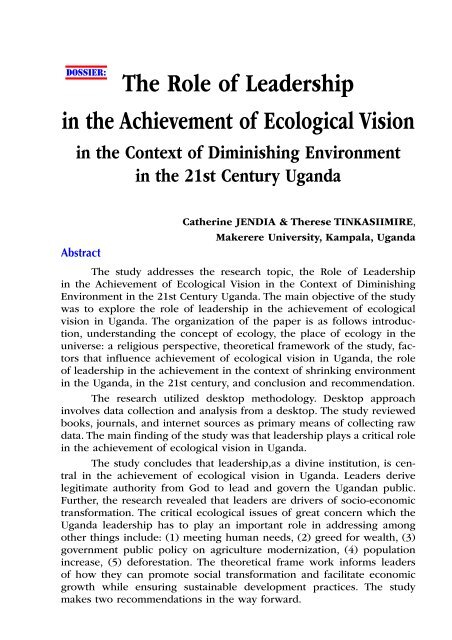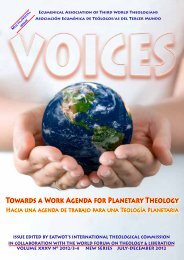voices-2013-2&3 - EATWOT's International Theological Commission
voices-2013-2&3 - EATWOT's International Theological Commission
voices-2013-2&3 - EATWOT's International Theological Commission
Create successful ePaper yourself
Turn your PDF publications into a flip-book with our unique Google optimized e-Paper software.
· 15DOSSIER:The Role of Leadershipin the Achievement of Ecological Visionin the Context of Diminishing Environmentin the 21st Century UgandaAbstractCatherine JENDIA & Therese TINKASIIMIRE,Makerere University, Kampala, UgandaThe study addresses the research topic, the Role of Leadershipin the Achievement of Ecological Vision in the Context of DiminishingEnvironment in the 21st Century Uganda. The main objective of the studywas to explore the role of leadership in the achievement of ecologicalvision in Uganda. The organization of the paper is as follows introduction,understanding the concept of ecology, the place of ecology in theuniverse: a religious perspective, theoretical framework of the study, factorsthat influence achievement of ecological vision in Uganda, the roleof leadership in the achievement in the context of shrinking environmentin the Uganda, in the 21st century, and conclusion and recommendation.The research utilized desktop methodology. Desktop approachinvolves data collection and analysis from a desktop. The study reviewedbooks, journals, and internet sources as primary means of collecting rawdata. The main finding of the study was that leadership plays a critical rolein the achievement of ecological vision in Uganda.The study concludes that leadership,as a divine institution, is centralin the achievement of ecological vision in Uganda. Leaders derivelegitimate authority from God to lead and govern the Ugandan public.Further, the research revealed that leaders are drivers of socio-economictransformation. The critical ecological issues of great concern which theUganda leadership has to play an important role in addressing amongother things include: (1) meeting human needs, (2) greed for wealth, (3)government public policy on agriculture modernization, (4) populationincrease, (5) deforestation. The theoretical frame work informs leadersof how they can promote social transformation and facilitate economicgrowth while ensuring sustainable development practices. The studymakes two recommendations in the way forward.





